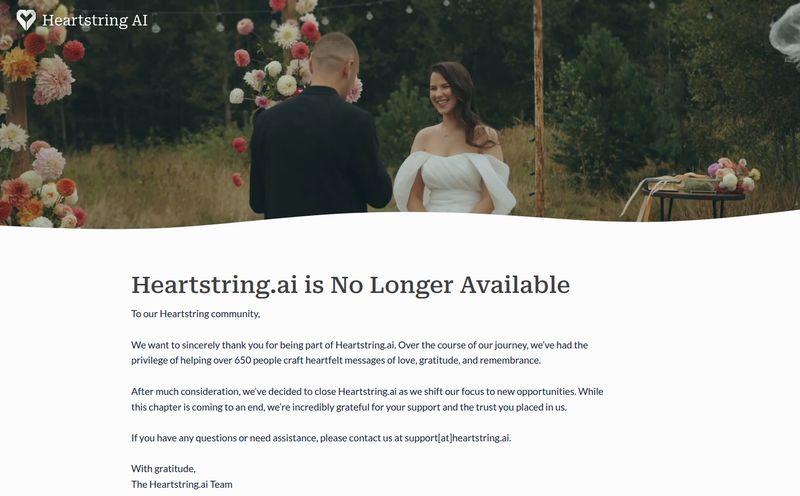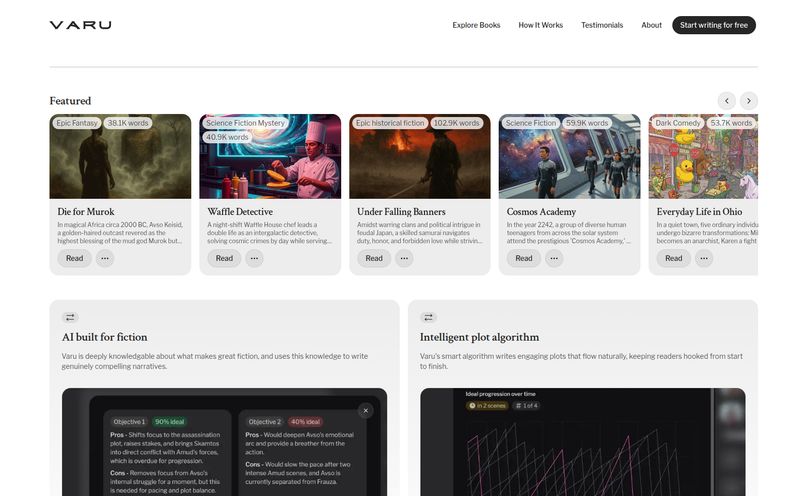The world of wellness apps is… crowded. You've got Headspace, you've got Calm, you've got a dozen others all promising to soothe your frazzled nerves with guided meditations and calming soundscapes. I've tried most of them. And while they’re great, I always hit a wall. I’d find myself scrolling endlessly through libraries of pre-recorded sessions, looking for that perfect vibe. You know the one. Not just “rain sounds,” but “rain on a tin roof while I’m cozy in a cabin.” Not just “beach waves,” but “distant waves on a cool, empty beach at dusk.”
The big apps just can't get that specific. It's not scalable. But what if something could?
I stumbled upon a new tool called Dreambience, and the premise felt like it was pulled straight from my brain. It’s an AI-powered app that claims to create a personalized meditation experience from just three keywords. Three. That's it. My inner SEO nerd and my burnt-out human self were equally intrigued. Could an algorithm really craft a bespoke chill-out session better than a human? I had to find out.
So, What Exactly is Dreambience?
Think of Dreambience not as a library, but as a laboratory. It’s a minimalist app with a single, powerful function: you give it three words that describe your ideal calming environment, and its AI gets to work, generating a unique audio experience just for you. The whole point is to move beyond the generic and create something that is uniquely yours.
The example on their site is a perfect illustration: "Campfire, Forest trip, Winter."

Visit Dreambience
Instantly, you can almost feel that scene, right? The crackle of wood, the crisp air, the quiet stillness of a winter forest. That's the magic it's aiming for. Whether you need help focusing for work, winding down after a long day, or finally getting some decent sleep, Dreambience offers a custom-built escape route. No more scrolling, just creating.
My First Tangle with an AI Zen Master
Okay, time to put it to the test. For my first attempt, I decided to conjure up one of my favorite real-world scenarios. I typed in: "Rainy Bookstore, Soft Jazz, Fireplace."
I hit 'Generate' and waited, half-expecting a garbled mess of noise. What I got instead was… surprisingly coherent. And genuinely relaxing. It wasn't just a loop of rain sounds. I could hear the gentle, muffled sound of rain against a window, the low murmur of a distant, smooth jazz saxophone, and the soft, intermittent crackle of a fire. It felt layered. It felt, for lack of a better word, ambient.
It wasn't perfect, mind you. There was a moment where the audio felt a little synthetic, a bit too clean. But it was miles better than I expected. It was like having a personal sound designer on call, ready to mix a track for my exact mood. I was impressed. My next attempt was "Ocean, Distant Thunder, Quiet Wind." Again, it nailed the atmosphere. The aural texture was rich enough to help my mind settle without being distracting.
How Dreambience Fits in a Saturated Market
As an SEO guy, I find the strategy here fascinating. The big meditation apps are fighting for broad keywords like "meditation" or "sleep sounds." It's a brutal, high-CPC battleground. Dreambience, on the other hand, is built for the long-tail keyword. It’s for the person searching for “sounds of a victorian library during a thunderstorm.” No app has a pre-made track for that, but Dreambience can create it on the fly. It's a clever way to capture traffic and serve a need that the giants are simply too big to address.
"It's less about competing with Calm's massive library and more about creating a new category of user-generated mindfulness."
This approach gives it a unique selling proposition in a space where, frankly, a lot of the offerings feel pretty similar. It’s a tool for creation, not just consumption.
The Good, The Quirky, and The Not-Yet-There
No tool is perfect, especially a new one. After playing around with Dreambience for a while, here’s my honest breakdown.
What I Genuinely Liked
The personalization is the obvious winner. The ability to mix and match concepts is fantastic. It’s like being a DJ for your own subconscious. The simplicity is another huge plus. There's no complex interface, no subscription tiers being pushed in your face, no analysis paralysis. You open it, you type, you relax. Its a bit refreshing.
Some Caveats to Consider
Now for the other side of the coin. The biggest issue for many will be the platform availability. As of this writing, there is no iOS app. For the massive iPhone user base, thats a non-starter. I tested this on Android, where it works fine, but they're cutting out a huge chunk of the market until they launch on the App Store. Secondly, the website is incredibly sparse. As a professional, I look for transparency, team info, a clear roadmap. The site offers very little, which might make some users hesitant. It feels more like a cool tech demo than a fully-fledged product right now.
What's the Price of AI-Powered Serenity?
This is the million-dollar question, isn't it? And the answer is… I don't know. I scoured the website and the app, and there is absolutely no pricing information available. This usually means one of two things: it's either in a free beta period to gather users and feedback, or a pricing model is coming soon. For now, it seems to be completely free to use, which is fantastic. My advice? Get in and try it now while you can without pulling out your credit card.
So, Who is This For?
I don't think Dreambience is going to replace Headspace for people who rely on Andy Puddicombe's guided courses. But it's not trying to. I see it being perfect for a few types of people:
- The Creative Meditator: Anyone who gets a kick out of crafting their own perfect vibe.
- The Seasoned Pro: People who are tired of the same old guided sessions and just want a high-quality, custom background for their own practice.
- The Easily Distracted: If you find guided voices distracting, this is a brilliant alternative to create pure, unobtrusive soundscapes.
Final Thoughts: Is AI Our New Guru?
Dreambience is a fascinating little experiment that largely succeeds. It's a glimpse into a future where wellness isn't one-size-fits-all, but infinitely customizable. It has its rough edges—the lack of an iOS app is a big one—but the core technology is surprisingly effective. It’s not going to teach you the philosophy of mindfulness, but it is an incredible tool for creating a space for it to happen.
Is it a gimmick? I don't think so. It's a clever, focused tool that does one thing really well. Will I keep using it? Absolutely. It’s earned a spot in my digital wellness toolkit, right alongside my other, more traditional apps. It’s the wild card, the creative spark for when I need something a little different. And in today's world, a little different can make all the difference.
Frequently Asked Questions
What is Dreambience in simple terms?
Dreambience is a mobile app that uses AI to create personalized meditation sounds and ambiances. You just type in three keywords (like "beach, sunny, quiet") and it generates a unique audio experience for you to relax, focus, or sleep.
How does the AI keyword thing actually work?
You input three words describing a scene or feeling. The app's AI interprets these keywords and algorithmically generates a soundscape by combining and layering relevant audio elements to match your description. Think of it as an audio collage created on demand.
Is the Dreambience app free?
As of late 2023, there is no pricing information available on their website or in the app. This suggests it is currently free to use, possibly as part of an introductory or beta phase.
Is Dreambience available for iPhone and iOS?
Currently, Dreambience is only available for Android devices. An iOS version has not been released yet, which is a significant limitation for iPhone and iPad users.
Can this replace my subscription to Calm or Headspace?
Probably not, if you use those apps for their guided meditations, human instructors, and structured courses. Dreambience is different. It excels at creating custom, unguided soundscapes. It’s best seen as a complementary tool, not a direct replacement.
What are some good keyword examples to try?
Get creative! Try combining places, weather, and feelings. For example: "Cozy Cabin, Snowing, Quiet," or "Summer Night, Crickets, Gentle Breeze," or even something abstract like "Focus, Calm, Flow." The fun is in the experimentation!
References and Sources
- Psychology Today on Meditation - An overview of the psychological benefits of a consistent meditation practice.
- TechCrunch on AI in Mental Health Apps - An article discussing the broader trend of generative AI being integrated into wellness and mental health platforms.



